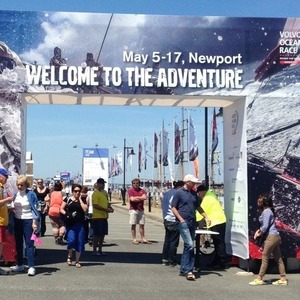Biodiesel helps power Volvo Ocean Race

May 14, 2015
BY The National Biodiesel Board
The Volvo Ocean 65 race boats that sailed into Narragansett Bay, Rhode Island, for the North American Stopover are refueling with biodiesel made from recycled cooking oil sourced from thousands of New England restaurants.
As a supporting sponsor of the May 5-17 stopover, the National Biodiesel Board is providing biodiesel blends for the race boats and for all of the diesel generators and land vehicles associated with the shoreside operations—helping the event to obtain certification by Sailors for the Sea as a “Platinum Level” Clean Regatta.
“Biodiesel stakeholders are excited to take part in this much-anticipated international regatta,” said Paul Nazzaro, NBB program manager. “It seems fitting that America’s first advanced biofuel will be featured at the U.S. leg of the race, where sustainability is such a prominent theme. Our entire team looks forward to sharing the many benefits of biodiesel over the course of this extraordinary event.”
Advertisement
Advertisement
Biodiesel is a domestically produced, clean-burning diesel replacement made from an increasingly diverse mix of resources, including agricultural oils, recycled cooking oil, and animal fats. Compatible with all diesel engines without modification, biodiesel blends can be used in many types of marine vessel, including inland and ocean-going commercial ships, research vessels, the U.S. Coast Guard Fleet, and recreational vessels, which alone consume nearly 100 million gallons of diesel fuel annually.
While start-up, power, range and cold-weather performance characteristics are similar to diesel, biodiesel’s higher lubricity is proven to reduce engine wear, and its nontoxic, low carbon, biodegradable qualities are less polluting to the ocean and air, and safer for humans and marine life.
Advertisement
Advertisement
“We’re in a chicken-or-egg situation where boaters can’t readily purchase biodiesel because it’s not typically supplied by marinas, and the marinas don’t dedicate tanks to biodiesel because they aren’t sure if there will be sufficient demand” said Nazzaro. “We hope Volvo’s show of confidence in biodiesel to help power such a high profile event will help address this conundrum by educating consumers and raising demand.”
NBB has a display at the Volvo Race Village throughout the stopover where 5-gallon jerry cans of biodiesel are available for the public to test out blending biodiesel with their regular marina fuel.
NBB is the national trade association representing America’s first advanced biofuel. The industry has produced more than a billion gallons each of the last four years, supporting more than 62,000 US jobs and is the first and only EPA-designated advanced biofuel produced on a commercial scale nationwide.
Related Stories
Kintetsu World Express Inc. has signed an additional agreement with Hong Kong, China-based Cathay Pacific Airways for the use of sustainable aviation fuel (SAF). The agreement expands a three-year partnership between the two companies.
Broco Energy on July 17 announced a new partnership with the Massachusetts Port Authority (Massport) to deliver and transition Massport's fuel tanks to renewable diesel across its various facilities.
Shell Aviation, Accenture, and Amex GBT on July 10 announced Avelia is in the process of evolving to an industry solution with independent data hosting and a multi-supplier model helping users access the GHG benefits of SAF.
Avia Solutions Group, the world's largest ACMI (aircraft, crew, maintenance, and insurance) provider, has partnered with DHL Express to reduce greenhouse gas emissions from its international shipments using SAF.
Bangkok Airways Public Company Limited has officially announced the adoption of sustainable aviation fuel (SAF) on its commercial flights, reinforcing Thailand’s green aviation industry. The initiative took effect starting July 1, 2025.
Upcoming Events










